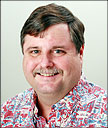
|
Honolulu Lite
Charles Memminger
|
Lite watches the watchdog (Take 3)
AS THE INVENTOR of "investigative humorism," it is my duty to dig up serious stuff and then make fun of it. But making fun of Citizens Against Government Waste, the Washington, D.C.-based private "watchdog" group, is just too easy.
As reported in recent columns, CAGW likes to criticize congressional representatives like Hawaii Sen. Dan Inouye for bringing "pork barrel" projects to their states, projects CAGW deems a waste of taxpayer money. CAGW likes to highlight projects that appear to be really silly, like Alaska's "bridge to nowhere," the Tea Pot Museum in North Carolina and, in Hawaii, employing dogs to sniff out brown tree snakes at the airport.
Being devoutly anti-government waste, I always got a kick out of CAGW's work. Until I found out that CAGW takes money from private organizations and sometimes lobbies on their behalf or attacks opponents of those organizations ... all without disclosing its own possible conflicts of interest. I was really disappointed that a supposedly neutral "watchdog" group wasn't necessarily neutral. It was if I had found out that my favorite unbiased private product tester, Consumer Reports, was taking money from Frigidaire and then blasting Kenmore. (It doesn't.)
I quoted an exposé by Bill Adair, Washington bureau chief for the St. Petersburg Times, that said CAGW had taken $100,000 from Mexican avocado growers and then criticized the California Avocado Commission for trying to stop imported Mexican avocados. According to Adair, CAGW also took money from tobacco interests and then lobbied against federal tobacco regulations. CAGW did not disclose the apparent conflicts of interest in either case.
WELL, I HEARD from David Williams, CAGW vice president for policy, and his feelings were hurt. He said the figures cited in my column were "grossly inaccurate," and demanded a correction. I said, "OK, how much money did you take from the tobacco and avocado guys?" He said he couldn't tell me. All donations to CAGW are private. I said that since I had simply -- and accurately -- quoted Adair, there was nothing to correct.
Then he said that CAGW identifies pork projects not on their lack of merit, but on seven specific criteria, such as whether the funding requests go through congressional hearings or whether the appropriation serve only a special interest.
"We don't look at the merits of a project," he said.
Hold on, I said. You made fun of the Alaska "bridge to nowhere" and the Tea Pot Museum. You always question the merits of projects, I said.
He said they comment on a project's lack of merit only AFTER they have deemed them pork according to their seven criteria. How convenient.
I pointed out that CAGW has for years made fun of Hawaii's attempt to keep the brown tree snake out of the islands. While using Snoopy dogs to sniff out snakes might seem silly, CAGW knows that if the brown tree snake got into Hawaii, our multibillion-dollar tourist industry could be badly hurt. Williams wouldn't say why CAGW hasn't pointed that out. More important, I asked, why doesn't CAGW disclose when it has a possible conflict of interest when it takes money from one organization and then criticizes a competitor of that organization?
Williams said -- seriously -- that CAGW has so many donors, it can't tell if there's a conflict between the money it takes in and the criticism it dishes out. And besides, he stressed again, donors expect privacy. I bet they do.
That's a hell of a policy for a supposedly neutral, nonbiased watchdog group. And one that is so, so easy to make fun of by an investigative humorist.
Buy Charles Memminger's hilarious new book, "Hey, Waiter, There's An Umbrella In My Drink!" at island book stores or
online at any book retailer. E-mail him at
cmemminger@starbulletin.com

